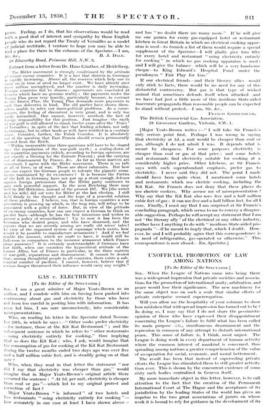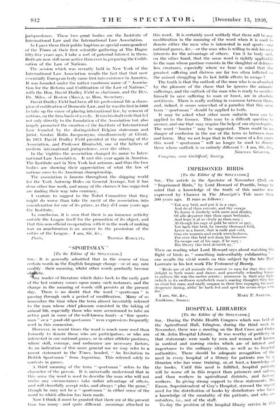UNOFFICIAL PROMOTION OF LAW AMONG NATIONS
[To the Editor of the ScEetaron.] Sur,—When the League of Nations came into being there was a widespread impression that private societies and associa- tions for the promotion of international amity, arbitration, and peace would lose their significance. The new machinery for the same object was on such a scale that similar efforts or
private enterprise seemed supererogation.
Will you allow me the hospitality of your columns to show
how mistaken that widespread impression has turned out to ire? In doing so, I may say that I do not share the pessimistic opinion of those who have expressed their disappointment concerning the League's failure to fulfil what has been called its main purpose—viz., simultaneous disarmament and the repression in common of any attempt to disturb international peace. This sense of failure is, I think, most unjust. The League is doing work in every department of human out us ity where the common interest of mankind is concerned. thus spreading among nations a greater comprehension of the value of co-operation for social, economic, and moral betterment.
The result has been that instead of superseding private efforts the League has stimulated them to still greater activity than ever. This is shown by the concurrent existence of some sixty such bodies centralized in Geneva itself.
My more immediate object in this letter, however, is to call attention to the fact that the creation of the Permanent International Court at The Hague and the acceptance of its jurisdiction by the leading States of the world has given an impetus to the two great associations of jurists on whose work it is bound to rely for guidance in the development of its
jurisprudence. These two great bodies arc the Institute of International Law and the International Law Association. As I gave them their public baptism as special correspondent
of the Times at their first scientific gathering at The Hague fifty-five years ago, I take a sort of paternal interest in them. Both arc now still more active then ever in preparing the Codifi- cation of the Law of Nations.
The session which was recently held in New York of the International Law Association recalls the fact that that now essent ially European body came first into existence in America. It was founded under the rather cumbrous name of '' Associa- tion for the Reform and Codification of the Law of Nations," with the lion. David Dudley Field as chairman, and the Rev. Dr. Miles, of Boston (Mass.), as Hon. Secretary.
David Dudley Field had been all his professional life a cham- pion of codification of Domestic Law, and he was the first in 1860 to take up the cause of placing international law, by consent of not ions, on the firm basis of a code. It was his draft code that led not only directly to the foundation of the Association but also largely promoted the creation of the Institute of International Law founded by the distinguished Belgian statesman and jurist, Gustav Rohn Jacqucmyns, simultaneously at Ghent. In 1875 David Dudley Field presided at the meeting of the Association, and Professor Bluntschli, one of the fathers of modern international jurisprudence, over the other.
In the 'eighties the association changed its name to Inter- national Law Association. It met this year again in America. The Institute met in New York last autumn, and thus the two bodies are showing their appreciation of what the law of hilt ions owes to its American championship.
The association is famous throughout the shipping world for the York Antwerp Rules on General Average, but it has done other fine work, and many of the clauses it has suggested are finding their way into currency.
I venture to suggest to the Nobel Committee that they might do worse than take the merit of the association into consideration for one of its prizes, as they dki some years ago the Institute.
In eonclusion, it is seen that there is an immense activity outside the League itself for the promotion of its object, and that this non-official co-operation with it in the work of making war an anachronism is an answer to the pessimism of the critics of the League.- I am, Sir, 11e.,
THOMAS BA RCLA















































 Previous page
Previous page